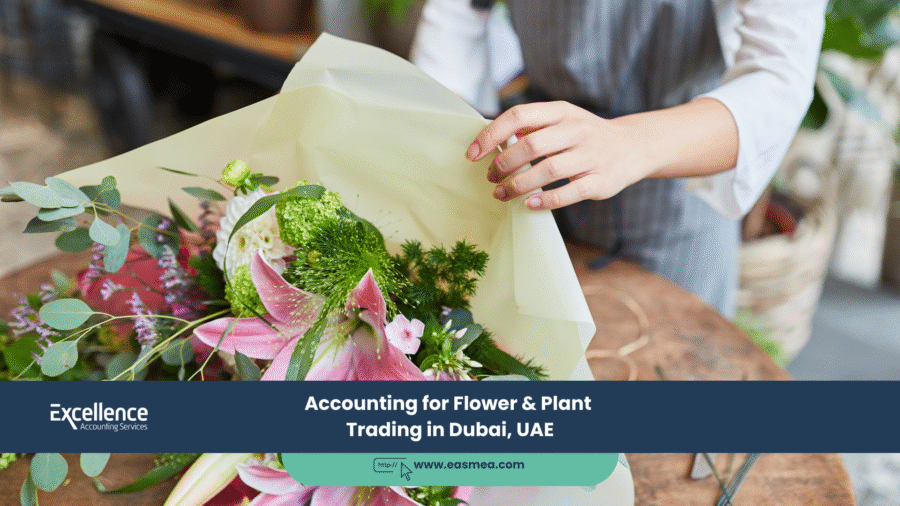Accounting for Flower & Plant Trading (Florists) in Dubai, UAE
The flower and plant trading business in Dubai is a vibrant, fast-paced industry where beauty and business acumen must blossom together. From daily bouquets and retail plant sales to extravagant floral arrangements for weddings and corporate events, florists operate a complex business model. Success hinges on more than just creative flair; it demands precise financial management, especially when dealing with highly perishable inventory and project-based revenue streams.
Standard accounting practices often fall short for florists. How do you account for flowers that wilt before they are sold? How do you recognize revenue from a wedding booked six months in advance? How do you track the true cost of delivering a single bouquet? Overlooking these nuances can lead to cash flow problems, inaccurate profit reporting, and tax compliance issues.
This guide provides a detailed framework for Accounting for Flower & Plant Trading in Dubai. We will explore the critical financial challenges unique to florists, from managing spoilage and valuing inventory to accounting for large-scale events and navigating the complexities of VAT and UAE Corporate Tax. Implementing these practices will provide the financial clarity needed to cultivate a thriving and profitable business.
Key Takeaways
- Perishable Inventory is Key: Spoilage and waste are a major cost of goods sold (COGS). Implement a system to track and account for discarded inventory daily.
- Event-Based Accounting: For large events like weddings, use project-based accounting. Track deposits as liabilities (Deferred Revenue) and recognize revenue only when the event is delivered.
- Cost of Goods Sold (COGS) is Complex: COGS for florists includes not just flowers, but also vases, ribbons, floral foam, and a direct allocation of spoilage costs.
- Track Delivery Costs Separately: Understand the true cost of your delivery service by tracking fuel, vehicle maintenance, and driver salaries. Decide whether to treat delivery fees as a separate revenue stream or part of the cost of sale.
- Tax Compliance is Crucial: Flowers and plants are subject to 5% VAT. Your business is also subject to UAE Corporate Tax, requiring accurate and detailed financial records.
The Unique Financial Ecosystem of a Florist Business
A florist’s business model is a delicate balance of retail, e-commerce, and event management. This hybrid nature creates unique accounting challenges. You might sell a single rose in-store, fulfill an online order for a subscription box, and design the floral arrangements for a large wedding all in the same week. Each of these revenue streams has a different cost structure, sales cycle, and revenue recognition principle.
Core Accounting Principles for Florists
Effective accounting for a florist is built on mastering three critical areas: perishable inventory, event sales, and logistics.
1. Mastering Perishable Inventory Management (Spoilage & Waste)
Unlike businesses selling durable goods, a florist’s main asset—fresh flowers—has an extremely short shelf life. This makes inventory management the most critical aspect of financial control.
- Daily Spoilage Tracking: This is non-negotiable. At the end of each day or week, you must record the cost of all flowers and foliage that were discarded. This amount is not just a loss; it’s a direct component of your Cost of Goods Sold (COGS).
- Valuation: The First-In, First-Out (FIFO) method is essential. You must assume you are selling your oldest flowers first, which accurately reflects the physical reality and helps in managing stock rotation.
- Accurate Costing: The cost of your inventory isn’t just the price you paid the grower. It must include shipping fees, import duties, and any special handling costs. This “landed cost” is the true cost of your inventory.
For a florist, unsold inventory isn’t just dead stock; it’s a daily, tangible expense. Tracking spoilage accurately is the difference between perceived profit and actual profit.
2. Accounting for Event-Based Projects (Weddings & Corporate Gigs)
Large events are often highly profitable but require careful financial management over a long period.
- Deposits are Liabilities: When a client pays a deposit for a wedding six months away, that cash is not yet your revenue. It must be recorded on your balance sheet as a liability under “Deferred Revenue” or “Customer Deposits.”
- Project-Based Costing: Create a separate budget for each major event. Track all direct costs associated with it, such as specific flowers ordered, vase rentals, and freelance florist fees. This allows you to calculate the exact profitability of each event.
- Revenue Recognition: You only recognize the revenue (and move the amount from Deferred Revenue to Sales Revenue) on the date the event takes place and the flowers are delivered. This adheres to the accrual accounting principle of matching revenues with the expenses incurred to generate them.
3. Managing Delivery & Logistics Costs
Delivery is a core service for most florists, but its costs can quickly erode profits if not managed properly.
- Isolate Delivery Costs: Create a separate expense category for all delivery-related costs, including vehicle purchase/lease, insurance, fuel, maintenance, and the driver’s salary.
- Analyze Profitability: By comparing your total delivery costs to the delivery fees you charge, you can determine if your delivery service is a profit center, a break-even service, or a loss leader designed to attract customers. This data is vital for setting your delivery prices correctly.
| Financial Item | Description | Accounting Treatment |
|---|---|---|
| Wedding Deposit | A 50% upfront payment for a wedding in 3 months. | Record as cash and a corresponding liability (Deferred Revenue). Do not recognize as sales revenue yet. |
| Wilted Flowers | Flowers that could not be sold and were discarded. | Record the cost of these flowers as part of the Cost of Goods Sold (COGS) under “Spoilage” or “Waste”. |
| Delivery Van Fuel | Monthly fuel expenses for your delivery vehicle. | Record as a “Delivery Expense” or “Logistics Cost”. Do not include in COGS. |
| Vases & Ribbons | Supplies used to create bouquets. | These are part of your inventory. Their cost is moved to COGS only when the final arrangement is sold. |
Navigating UAE Tax and Compliance
The UAE’s tax regulations apply fully to the florist industry. For the most reliable information, always refer to the official Federal Tax Authority (FTA) website.
VAT on Flowers and Plants
The sale of flowers, plants, and related products (like vases and soil) is subject to the standard 5% VAT rate in the UAE. You must charge this VAT to your customers and remit it to the FTA. It is also crucial to maintain proper records to reclaim the VAT you pay on your business purchases (e.g., flowers from suppliers, rent, utilities).
UAE Corporate Tax
Your florist business will be subject to the 9% UAE Corporate Tax on its annual taxable income that exceeds AED 375,000. Your accounting records are the backbone of your tax filing. The accuracy of your spoilage calculations, event cost tracking, and revenue recognition will directly determine your taxable profit. Engaging professional corporate tax services is essential for ensuring compliance and optimizing your tax position.
What Excellence Accounting Services (EAS) Can Offer
Navigating the unique financial landscape of a florist requires specialized expertise. At Excellence Accounting Services, we provide tailored solutions to help your business bloom.
- Inventory Management Systems: We help you implement robust systems for tracking perishable stock and accounting for spoilage, ensuring your COGS and profits are always accurate.
- Project Accounting for Events: Our team can set up project-based accounting to manage large-scale events, from tracking deposits and costs to ensuring correct revenue recognition, giving you clear visibility on the profitability of each event.
- Cash Flow Management: We provide expert accounting and bookkeeping services to manage the seasonal peaks and troughs of the floral industry, ensuring you have healthy cash flow year-round.
- Compliance & Audit: Our internal audit services can review your processes, identify areas of financial leakage, and ensure your business is fully compliant with UAE tax laws.
Frequently Asked Questions (FAQs)
You should create a “spoilage log.” At the end of the day or week, list all the flowers you are discarding and their original cost. The total cost from this log is then recorded with a journal entry: Debit “Cost of Goods Sold – Spoilage” and Credit “Inventory.” This correctly moves the cost of the wasted flowers from an asset (inventory) to an expense (COGS) in the period the waste occurred.
This is a credit sale. When you deliver the flowers, you recognize the revenue immediately. The journal entry would be: Debit “Accounts Receivable” (an asset representing the money owed to you) and Credit “Sales Revenue.” When the client pays you 30 days later, you record a second entry: Debit “Cash” and Credit “Accounts Receivable” to clear the balance.
This is a sale of services. The revenue from workshop fees should be recorded separately from your product sales. Any materials (flowers, tools) provided to participants during the workshop should be expensed as “Workshop Costs” or “Cost of Services,” not run through your main product COGS.
When a customer pays for the month, you should initially record the cash as “Deferred Revenue.” As you deliver each weekly or bi-weekly arrangement, you recognize a portion of that revenue. For example, if a customer pays AED 400 for four weekly deliveries, you would recognize AED 100 in revenue each time you make a delivery.
Yes. Delivery fees charged to customers should be recorded as “Delivery Fee Revenue” or “Shipping Revenue.” This should be kept separate from your “Sales Revenue” from products. This allows you to compare your delivery revenues directly against your delivery expenses to assess the profitability of your logistics operation.
This is an “extraordinary loss” and should be treated differently from regular daily spoilage. You should write off the entire cost of the lost inventory at once. The journal entry would be: Debit an expense account like “Loss from Equipment Failure” or “Inventory Write-Off” and Credit “Inventory.” This isolates the major, non-recurring loss from your regular operational COGS, giving you a clearer picture of your normal profitability.
This is a barter transaction. You must record the transaction at the “fair market value” of the goods or services exchanged. You would record revenue for the floral arrangement at its normal selling price, and simultaneously record an expense (e.g., “Marketing Expense” or “Professional Services”) for the same amount for the photography services you received. No cash changes hands, but the transaction must be reflected in your books.
When you sell the arrangement, the vase is part of the COGS. When a customer returns a vase, you are essentially buying it back. You would Debit “Inventory – Vases” for the credit amount you give the customer and Credit “Cash” or “Accounts Payable” (if you give them store credit). This brings the used vase back into your inventory at a low cost, ready to be reused.
Your accounting records must be in AED. When you purchase the plants, you convert the EUR invoice to AED using the exchange rate on that day and record the inventory and accounts payable. When you pay the invoice later, the exchange rate will likely have changed. The difference will result in a “Foreign Exchange Gain or Loss,” which is recorded on your income statement. This is a crucial detail for businesses that import goods.
Your inventory should be valued at the “lower of cost or net realizable value (NRV).” Cost is what you paid for it (using FIFO). NRV is the estimated selling price minus any costs to sell it. For florists, this is critical. If you have flowers that are a few days old and you know you’ll have to sell them at a 50% discount, you must write down their value in your books to that discounted price, even before they are sold or have wilted.
Conclusion: Cultivating Financial Success
Running a successful florist business in the UAE is a beautiful blend of art and science. While your creativity brings joy to customers, a disciplined and specialized approach to accounting ensures the long-term financial health and sustainability of your business. By mastering the management of perishable inventory, adopting project-based accounting for events, and maintaining strict tax compliance, you lay the groundwork for your business to not just survive, but to flourish.
Let Your Profits Bloom.
Partner with Excellence Accounting Services to get the specialized accounting support your floral business needs to manage costs, maximize profits, and grow.




